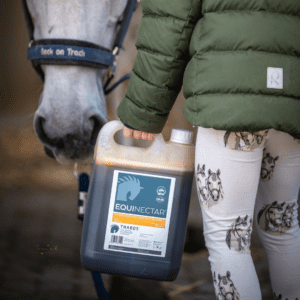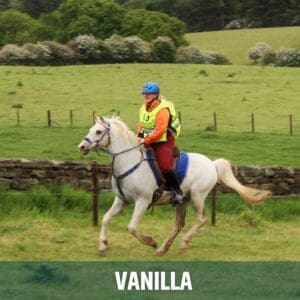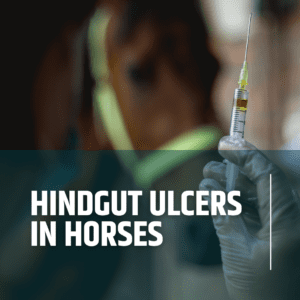01
Introduction
The relationship between weather and your horse's digestive health is closer than many owners realise. As Scandinavian spring unfolds with its cool temperatures, cloudy skies, and intermittent rainfall, understanding how these conditions affect your horse becomes critical for maintaining optimal health and wellbeing.
02
How Weather Influences Equine Digestion
Temperature Fluctuations and Gut Motility
When temperatures drop or fluctuate dramatically as they often do during Scandinavian springs (ranging from 3°C to 18°C) (2,3), your horse's digestive system responds accordingly. Cold weather can significantly decrease gut motility—the wave-like muscle contractions that move food through the digestive tract. This slowdown isn't merely uncomfortable; it can create serious health concerns.
During colder periods, horses naturally conserve energy by reducing blood flow to peripheral areas, redirecting it to vital organs. While this biological response is normal, the reduced circulation to the gut can lead to slowed digestion and increased risk of impaction colic—a potentially dangerous condition where food becomes trapped within the intestines.
Reduced Water Consumption
Perhaps the most concerning aspect of cooler, damp weather is its impact on hydration (7). Studies consistently show that horses tend to drink significantly less water when temperatures drop (8). A typical horse requires 30-45 litres of water daily (1), but consumption can drop by up to 40% during cold spells. This reduction creates a perfect storm for digestive complications:
- Drier intestinal contents move more slowly through the digestive tract
- Reduced water leads to thicker gut mucus, affecting nutrient absorption
- Dehydration can alter the gut microbiome composition, disrupting beneficial bacteria
Behavioural Changes Affecting Feeding Patterns
Cloudy conditions with limited sunlight, as forecasted across Scandinavia (2, 3), can influence feeding behaviours in subtle yet important ways. Reduced daylight hours affect horses' natural grazing rhythms, potentially causing them to consume larger amounts of feed in shorter periods rather than grazing continuously throughout the day.
This altered eating pattern can overwhelm the digestive system, particularly when combined with less movement during wet weather when turnout is limited. The result is often incomplete digestion of feed, creating excess gas and increasing the risk of colic episodes.
Seasonal Forage Changes and Digestive Impact
Spring in Scandinavia brings another challenge: rapidly changing pasture composition. As temperatures gradually warm to the forecasted 17-18°C in parts of Sweden and Denmark (4, 5), grass begins growing more vigorously, dramatically changing in both volume and nutritional profile.
This sudden shift presents several digestive challenges:
- Increased fructan levels (plant sugars) in young spring grass can overwhelm the hindgut
- Rapidly growing forage often contains higher moisture content and less structural fibre
- The transition from winter hay to spring grass requires significant adaptation from gut microbiota
For horses with sensitive digestive systems or those prone to laminitis, these changes can be particularly problematic, requiring careful management during wet, cool springs.
03
How EquiNectar Can Help Support Equine Digestive Health
While weather conditions may present challenges to equine digestive health, appropriate nutritional support can make a tremendous difference.
Enzymatic Support for Changing Forage
EquiNectar's formulation provides a comprehensive blend of active digestive enzymes derived from malted barley that are particularly valuable during seasonal transitions. These naturally occurring enzymes include:
- Amylase - Critical for breaking down starch in supplemental feeds that horses often require when turnout is limited due to wet conditions
- Fructanase - Helps process the fructans (complex sugars) found in rapidly growing spring pastures
- Phytase - Improves the availability of essential minerals like calcium and phosphorus from plant-based feeds
- Cellulase - Aids in the breakdown of complex plant cell walls in forage and hay
- Xylanase - Supports digestion of xylans in forage, improving overall feed utilisation
- Beta glucanase - Enhances the digestibility of forage by breaking down beta-glucans
When temperatures fluctuate between 3°C and 18°C as forecast across Scandinavia (3, 4, 5), these enzymes provide consistent digestive support regardless of changing environmental conditions.
Microbiome Support During Weather Transitions
The hindgut microbiome—comprising trillions of beneficial bacteria—is highly sensitive to dietary changes triggered by weather patterns (6). During cooler, damper conditions when horses drink less, this delicate ecosystem can quickly become unbalanced (7).
EquiNectar helps maintain microbiome stability during these challenging periods. By promoting a healthy gut environment, it helps:
- Maintain proper pH levels in the hindgut despite dietary fluctuations
- Support the natural balance of gut bacteria during periods of stress
- Support optimal fermentation processes even when feed quality and quantity change
A stable microbiome translates to more consistent droppings, reduced gas production, and decreased risk of digestive upset—particularly valuable during the spring's unpredictable weather patterns.
Enhancing Hydration When It Matters Most
EquiNectar's palatable syrup formulation serves another crucial purpose during cool weather: encouraging both feed and water consumption. When added to feed, its natural sweetness:
- Entices even selective eaters to finish their meals completely
- Can be mixed with water to increase overall fluid intake during cool periods
- Helps ensure proper hydration for optimal gut function despite temperature drops
During the forecasted rainy conditions across Norway and parts of Sweden during this week and the following week, maintaining adequate hydration becomes particularly important for preventing impaction risks.
04
Practical Application During Changing Weather
For horse owners facing the challenges of Scandinavian spring weather, implementing EquiNectar into daily routines offers practical benefits:
1. During temperature fluctuations: Include EquiNectar as part of your horse's daily routine to maintain digestive efficiency regardless of thermal stress on the digestive system
2. When transitioning to spring grass: Begin supplementation before turnout changes to prepare the hindgut for processing the increased fructan and changing fibre content
3. During periods of reduced turnout: Add EquiNectar to feeds when wet conditions limit movement to help compensate for reduced natural foraging behaviours
05
Beyond Digestion: Wider Benefits During Challenging Weather
The digestive support provided by EquiNectar extends beyond basic gut function to improve overall wellbeing during challenging weather conditions. Horse owners frequently report:
- Improved temperament and reduced irritability linked to digestive discomfort
- More consistent energy levels despite changing barometric pressure and temperature
- Better coat condition resulting from improved nutrient absorption
- Reduced instances of weather-related colic episodes
These outcomes are particularly relevant during the cloudy, cool, and humid conditions forecast across Scandinavia, which can otherwise contribute to digestive stress and behavioural changes.
06
Conclusion
While we cannot control the spring weather patterns across Sweden, Denmark, and Norway, we can certainly take proactive steps to support our horses' digestive health regardless of what the forecast brings.
By understanding how the predicted temperature ranges of 3-18°C, cloudy conditions, and intermittent rainfall affect equine digestion, and by implementing supportive measures like EquiNectar, horse owners can navigate seasonal transitions with confidence.
With proper management and appropriate nutritional support, your horse can thrive despite the meteorological challenges that Scandinavian springs inevitably bring.
References
1. Freeman D. E. (2021). Effect of Feed Intake on Water Consumption in Horses: Relevance to Maintenance Fluid Therapy. Frontiers in veterinary science, 8, 626081. https://doi.org/10.3389/fvets.2021.626081
2. BBC. (2025). Gallivare - Lapland Sweden weather forecast. https://weather.metoffice.gov.uk/forecast/u7yvcu8st#?date=2025-04-17
3. Visit Norway. (2025). Season Climate: Spring. https://www.visitnorway.com/plan-your-trip/seasons-climate/spring/
4. Met Office. (2025). Sweden weather forecast. https://weather.metoffice.gov.uk/world/sweden
5. Met Office. (2025). Denmark weather forecast. https://weather.metoffice.gov.uk/world/denmark
6. Clark, A., Sallé, G., Ballan, V., Reigner, F., Meynadier, A., Cortet, J., Koch, C., Riou, M., Blanchard, A., & Mach, N. (2018). Strongyle Infection and Gut Microbiota: Profiling of Resistant and Susceptible Horses Over a Grazing Season. Frontiers in physiology, 9, 272. https://doi.org/10.3389/fphys.2018.00272
7. Kentucky Equine Research. (2017, July 13). Reducing the Risk of Colic During Cooler Weather. https://ker.com/equinews/reducing-risk-colic-winter/
8. Blue Cross. (2023, December 5). Caring for your horse in winter. https://www.bluecross.org.uk/advice/horse/wellbeing-and-care/keeping-your-horse-warm-in-winter
ABOUT EQUINECTAR
Description
EquiNectar® is a natural feed supplement, that is scientifically proven to:
- Re-balance your horse’s gut bacteria
- Help your horse maximise benefits from its feed
- Improve your horse’s condition
More information
EquiNectar® is produced by Tharos Ltd in the UK. It is a natural source of digestive enzymes and contains only the following ingredients:
- Our patented enzyme rich malt extract
- Medium chain triglycerides (from coconut oil)
- Potassium sorbate
For more details of the enzymes within EquiNectar® take a look at the ingredients and enzymes page.
How to feed
Simply add EquiNectar® to your horse's daily feed, using the Feeding Rate chart to determine the correct amount.
For detailed instructions about how to introduce EquiNectar, please read the comprehensive Feeding Guide page.






